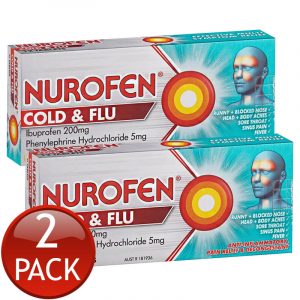Nurofen Cold & Flu tablets
Nurofen Cold & Flu tablets. The innovative dual action formulation of Nurofen Cold & Flu tablet offers fast, non-drowsy temporary relief from common cold and common flu symptoms. Formulated to relieve fever and general malaise, the trademarked product of Nurofen includes two pharmaceutical strengths – strength of r. Each formula is comprised of a distinctive, base anti-inflammatory ingredient and two additional therapeutic ingredients for treatment of pain and swelling. The double active formulation of Nurofen Cold & Flu tablet gives immediate, non-drowsy, instant relief of common cold and flu symptoms. Combining the targeted therapeutic action of Nurofen and the natural decongestants pseudoephedrine, every bottle of Nurofen Cold & Flu tablets provides long-term relief of cold and sore throat symptoms.
To answer the question above, if you suffer from frequent and recurring cold and sore throat symptoms, you should consider taking nurofen cold and flu tablets. Although many sufferers stop treatment when symptoms persist, more than half of all cold and sinus symptoms persist for at least six weeks, so you could be facing another bout of post-nasal drip for six to eight weeks or even longer. So, you need to consider extending your current tablet regimen for another six weeks to continue the relief you already are getting. However, many people who take nurofen cold and flu tablets stop treatment because their symptoms persist for longer than expected – an expected amount of time on average is three to five days between cold symptoms and the next cold episode.

Cold and Flu symptoms are often caused by several factors, including virus infection, excessive inflammation of mucous membranes, allergic reaction to airborne allergens, consumption of food or beverages that cause respiratory problems, and physical deficiencies. Cold and flu tablets contain several ingredients that help to treat each of these causes. For example, antihistamines help prevent the release of histamine from cells that line the nose and bronchial tubes. Histamine is a chemical substance in the body that contributes to inflammation of the nasal linings and air passages. Common antihistamines include Allegra, Claritin, and Droncit XR.
Nurofen Cold & Flu tablets – NSAID’s Controlling Gastrointestinal Bleeding
Some other medicines included in cold and flu tablets include Mefloquine, Penicillin G, Micronizedillin G, Zithromax, and Moxidil. Each of these contains a specific group of antigens. Penicillin G and Mefloquine, for example, contain penicillin antigens, amoxicillin, and streptomycin – the first four classes of antibiotics. Each class of antibiotic may cause allergic reactions like hives, rashes, and nausea if taken by individuals with compromised immunity. Hence, medical products for these purposes should be used cautiously.
A common cause of adverse reactions in individuals taking high blood pressure medications, especially nurofen, is the occurrence of an ulcer. Ulcers can form at any site along the peripheral vascular path. Although rare, some also occur at the sites of administration, such as the nose, mouth, esophagus, and lips. An ulcer is an inflamed area in which tissue has died, usually involving the lining of the gastrointestinal tract. Symptoms of ulcer include abdominal pain and cramping, nausea and vomiting, diarrhea, and a loss of appetite.
High blood pressure can increase the risk of ulceration. Nurofen and other NSAID medications should be taken with care to minimize the risks of an ulcer. Patients should not take nurofen if they have symptoms of hypertension or are undergoing treatment for this condition. Individuals who smoke, have a prior history of gastrointestinal bleeding, or are experiencing frequent gastrointestinal bleeding should also avoid taking nurofen or take their doctor’s advice on the matter.